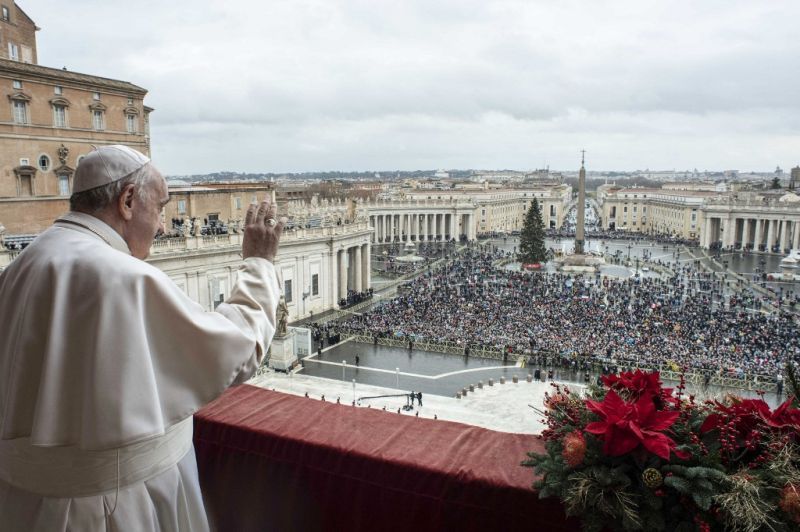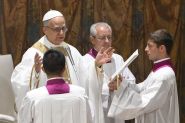- Home
- Middle East
- All Eyes Turn to Conclave After Pope Francis's Funeral

©AFP
With Pope Francis laid to rest, all eyes turn now to the conclave, the secretive meeting of cardinals set to convene within days to elect a new head of the Catholic Church.
Alongside world leaders and reigning monarchs, an estimated 400,000 people turned out on Saturday for the Argentine pontiff's funeral at the Vatican and burial in Rome.
The crowds were a testament to the popularity of Francis, an energetic reformer who championed the poorest and most vulnerable.
Many of those mourning the late pope, who died on Monday aged 88, expressed anxiety about who would succeed him.
"He ended up transforming the Church into something more normal, more human," said Romina Cacciatore, 48, an Argentinian translator living in Italy.
"I'm worried about what's coming."
On Monday morning, at 9:00 am (0700 GMT), cardinals will hold their fifth general meeting since the pope's death, at which they are expected to pick a date for the conclave.
Held behind locked doors in the frescoed Sistine Chapel, the election of a pope has been a subject of public fascination for centuries.
Cardinal-electors will cast four votes per day until one candidate secures a two-thirds majority, a result broadcast to the waiting world by burning papers that emit white smoke.
Luxembourg Cardinal Jean-Claude Hollerich said last week he expected the conclave to take place on May 5 or 6—shortly after the nine days of papal mourning, which ends on May 4.
German Cardinal Reinhard Marx told reporters on Saturday the conclave would last just "a few days".
Left his mark
Francis's funeral was held in St. Peter's Square in bright spring sunshine, a mix of solemn ceremony and an outpouring of emotion for the Church's first Latin American pope.
More crowds gathered on Sunday for the opening for public viewing of his simple marble tomb at the basilica of Santa Maria Maggiore, his favorite church in Rome.
Francis was buried in an alcove of the church, becoming the first pope in more than a century to be interred outside the Vatican.
"It was very emotional" to see his tomb, said 49-year-old Peruvian Tatiana Alva, who wiped away tears after joining hundreds of others filing past the burial place.
"He was very kind and humble. He used language young people could understand. I don't think the next pope can be the same, but I hope he will have an open mind and be realistic about the challenges in the world right now."
A couple of hours after opening, the large basilica was packed, the crowds periodically shushed over speakers.
Among the mourners were pilgrims and Catholic youth groups who had planned to attend the Sunday canonization of Carlo Acutis, which was postponed after Francis died.
Raphael De Mas Latrie, 45, from France, had been bringing his nine-year-old son to the canonization, but they attended the funeral instead, saying they "really appreciated" Francis's defense of the environment.
"Today in this material world his message made a lot of sense, particularly to young people," he said.
He added that Francis's successor did not have to be his likeness, for "every pope has a message for the world today".
In his homily at the funeral, Cardinal Giovanni Battista Re highlighted the Jesuit pope's defense of migrants, relentless calls for peace, and belief that the Church was a "home for all".
"I hope we get another pope as skilled as Francis at speaking to people's hearts, at being close to every person, no matter who they are," 53-year-old Maria Simoni from Rome said.
Many of the mourners expressed hope that the next pope would follow Francis's example at a time of widespread global conflict and growing hard-right populism.
Marx said the debate over the next pope was open, adding, "It's not a question of being conservative or progressive... The new pope must have a universal vision."
Pray for ourselves
More than 220 of the Church's 252 cardinals were at Saturday's funeral. They will gather again on Sunday afternoon at Santa Maria Maggiore to pay their respects at Francis's tomb.
There will also be a mass at St. Peter's Basilica at 10:30 am (0830 GMT) on Sunday, led by Pietro Parolin, who was secretary of state under Francis and is a front-runner to become the next pope.
Only cardinals under the age of 80 are eligible to vote in the conclave. There are 135 currently eligible—most of whom Francis appointed himself.
But experts caution against assuming they will choose someone like him.
Francis, a former archbishop of Buenos Aires who loved being among his flock, was a very different character from his predecessor Benedict XVI, a German theologian better suited to books than kissing babies.
Benedict in turn was a marked change from his Polish predecessor, the charismatic, athletic, and hugely popular John Paul II.
Francis's changes triggered anger among many conservative Catholics, and many of them are hoping the next pope will turn the focus back to doctrine.
Some cardinals have admitted the weight of the responsibility that faces them in choosing a new head of the world's 1.4 billion Catholics.
"We feel very small," Hollerich said last week. "We have to make decisions for the whole Church, so we really need to pray for ourselves."
With AFP
Read more



Comments